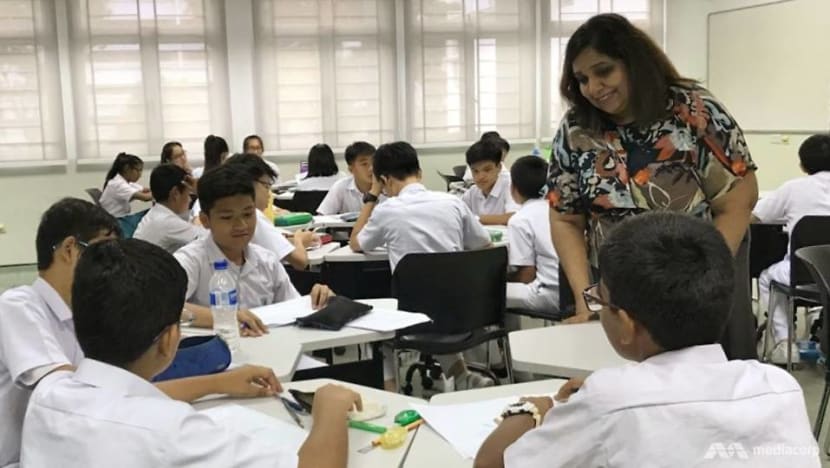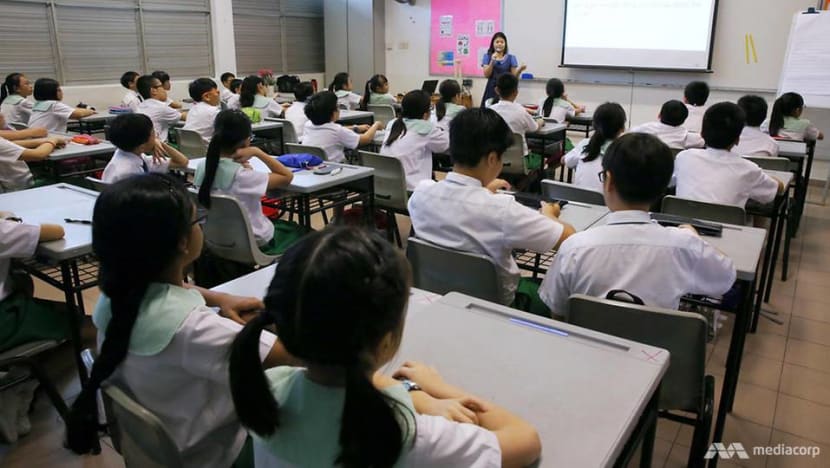commentary Commentary
Commentary: Public trust in our educators is fragile and can be easily fractured
Recent cases of misconduct and alleged impropriety should spur us to think about how to preserve strong relations between educators, students and parents, says one observer from the National Institute of Education.

Students at Swiss Cottage Secondary School discuss meritocracy and social inequality at a Glocal Perspectives class led by teacher Mini Sathiya Sidhan. (Photo: Lianne Chia)
SINGAPORE: From time to time, cases of teacher misconduct surface in the local press.
Just last week, educators have been found engaging in reprehensible behaviour, for instance, leaking examination questions and answers as was the case at the Singapore University of Social Sciences.
It did not help when further news of a Woodgrove Secondary teacher allegedly misappropriating money collected from students and that of a former Nanyang Technological University director being charged for conspiring with others to cheat the university out of more than S$200,000 broke on the same day.
These incidents have shone the spotlight on the professionalism of educators and threatened to erode public trust in the education line of work.
A PROFESSION THAT DEMANDS HIGH STANDARDS
The Ministry of Education has placed the utmost importance on teacher professionalism and set the tone for the field for many years.
In 2011, the Ministry put in place its Ethos of the Teaching Profession in an attempt to codify professional standards for all teachers.
Part of this ethos includes the teachers’ vision, centring around three key words: Lead, care and inspire.
Teachers are called upon to care for their students and touch their lives. They are looked upon to lead and inspire their students to believe in themselves and to be the best that they can be. They are also expected to forge trusting partnerships with families and the community in the wider interests of students.

Indeed, the vision expresses noble ideals that the Ministry hopes teachers will aspire towards and live by in their craft.
Very often, it is not so much the formal lesson content that students recall after they have left school, but the simple and seemingly insignificant acts outside of the classroom that teachers perform.
For instance, a recent news report about a Teck Whye Primary School teacher hugging her students as she handed them their Primary School Leaving Examination results highlights how a teacher’s work goes far beyond classroom instruction and examination preparation.
Her action illustrates the importance of attending to the socio-emotional well-being of students and how these connections form the basis of trust between teachers and students.
EDUCATORS MUST UPKEEP TRUST
How can teachers establish trusting partnerships with their students and their students’ parents?
This question is especially pertinent in view of the relatively young profile of the teaching workforce and amid challenges wrought by long hours, huge class sizes and an increasingly heavier administrative workload
For one thing, teachers need to demonstrate not just in word but in deed that they are competent and hold high professional standards.
First, teachers have to demonstrate to parents and students their competence - that they have a firm grasp of their subject content, and that they have a flexible pedagogical repertoire that meets their students’ varied learning needs.
For instance, an English language teacher might discover that some students learn more effectively through watching instructional videos that reinforce key grammar concepts. The teacher could then arrange for them to view the videos after school hours and monitor their progress in mastering these concepts.

Third, teachers must connect with every student and motivate him or her to do their best. This means taking the trouble to know each student and guiding him or her through the ups and downs of life in school (and often outside of school as well).
For instance, teachers may detect signs of child abuse in the home and take appropriate measures to help the child, including seeking help from social services.
READ: A wake-up call, when a disadvantaged child gets 8 out of 100 for an exam, a commentary
Not only is trust difficult to build up, it can easily be dissolved at a moment’s notice. All it takes is one unhappy incident, one case of perceived teacher bias or one case of teacher insensitivity to a student’s inability to follow the pace of lessons.
Having said that, though, it is important that teachers uphold professional integrity and make tough decisions when necessary.
It can be all too tempting to pander to students’ whims, for instance in designing less demanding assessments, in order to be viewed favourably by them.
Teachers also need to mete out punishments when there is clear evidence of student wrongdoing and be able to explain their rationale clearly to students and their parents if asked.
Such occasions often test the limits of parental and student trust in teachers as professionals, and may serve as a litmus test of teachers’ care for their students’ emotional and moral development.
How willing are teachers to stand up for what they believe to be sound pedagogy or moral principles in the face of possible adverse reactions from students and their parents?
REMEMBER TEACHER AREN’T SUPERHUMANS
All in all, it does seem like we expect our teachers to be superhuman, in a job that is demanding and highly emotional.

Amid the pressure of preparing students for examinations and competitions, teachers are also expected to be role models for their students.
They have to juggle these multiple tasks while having to meet tremendously high public expectations placed on their shoulders. It was just a few years ago that local media reports debated whether it was appropriate for teachers to smoke, drink or go clubbing.
When cases of misconduct arise, it is easy to throw shade on these educators who do not live up to their high calling but we should be careful not to paint all teachers with a broad brush.
Parents and Singapore’s wider community need to support teachers. Let’s not forget an indispensable part of a constructive relationship between teachers and parents involves trusting teachers to do the right thing.
READ: What an effective parent-teacher meeting looks like, a commentary
One factor that could challenge this longstanding public trust is the rise of overly interventionist parenting. Some parents might feel that some teachers fall short in attending to their children’s needs – and might constantly check in, intervene and suggest how teachers can do a better job.
These instincts need to be balanced against the need to put trust in teachers’ professionalism. When children see their parents constantly overriding school teachers, teacher-student trust is weakened.
Another challenge is the prevalence of private tutoring. When tutors offer alternative pedagogies that prove effective and can focus exclusively on the needs of a single student, there is a tendency for parents and students to measure school teachers’ work against private tutoring experiences – and come to view the teacher-student relationship in transactional terms.
READ: What is lost when we spend more on tuition, a commentary
The Ministry of Education claims that the future of the nation passes through teachers’ hands. In light of this, teachers’ work ought not to be under-estimated or denigrated.
At the same time, teachers have to constantly remind themselves that they have to uphold the ethos of the teaching profession so as to earn the respect of their students and the wider community.
Jason Tan is associate professor at the National Institute of Education.














